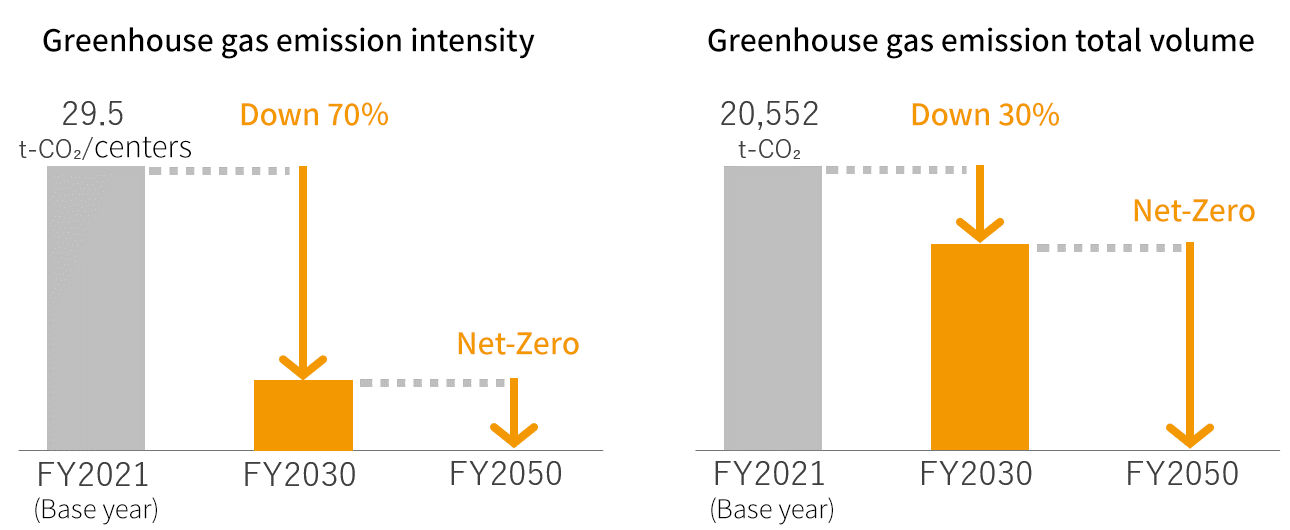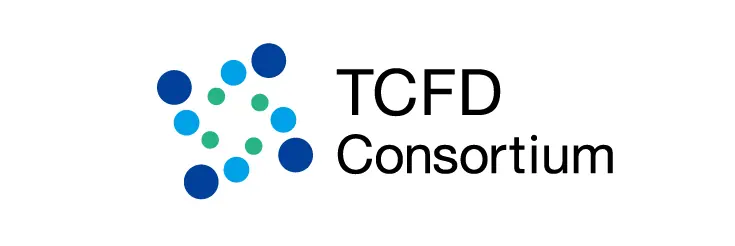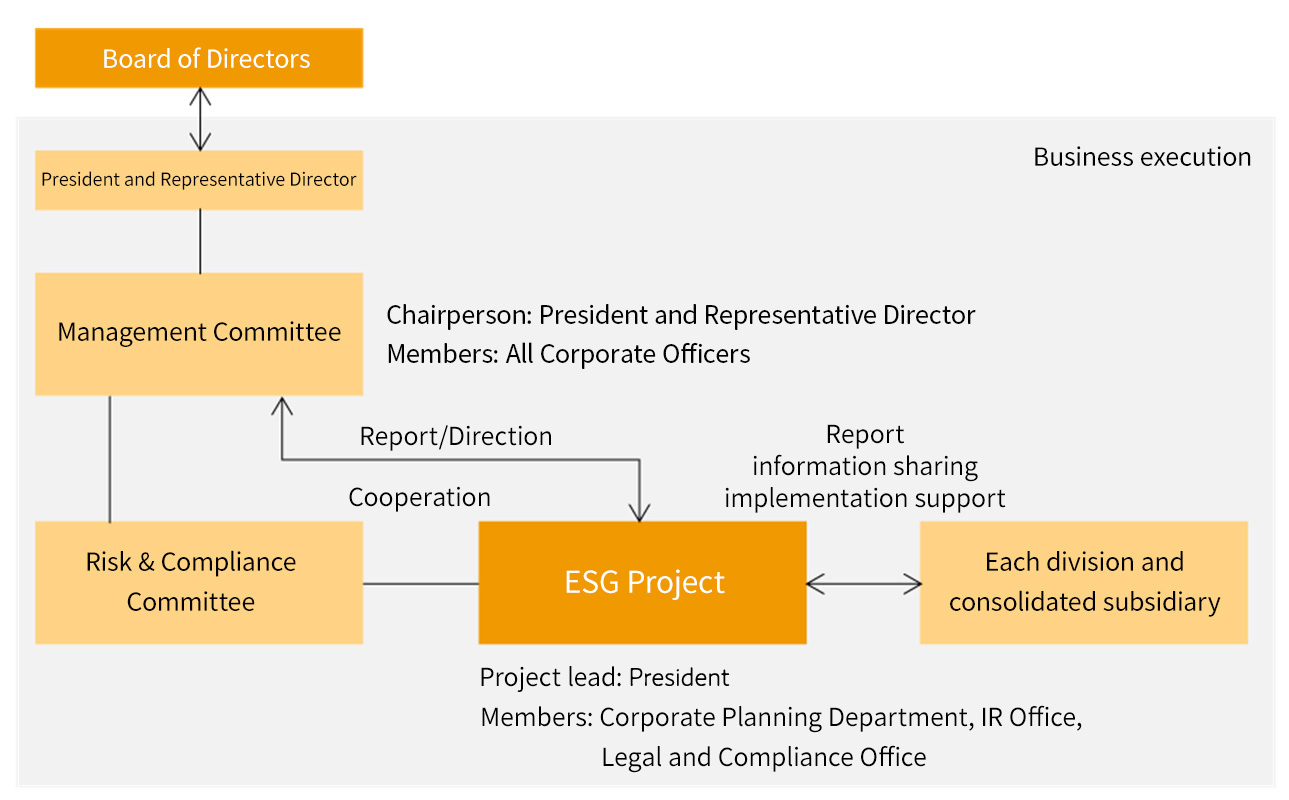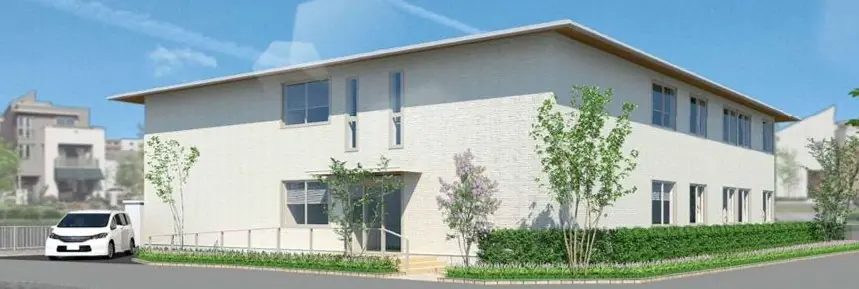Initiatives for Environment
Solasto Group’s Long-term Environmental Targets
Solasto aims to realize its corporate philosophy, “People. Technology. Supporting comfortable living and energetic communities,” and continue to contribute to society by providing solutions to social issues and valuable services throughout its business activities. To continuously grow together with society based on this philosophy, we have identified important issues that we must prioritize and formulated them into five sustainability themes. “Consideration for the environment and resources” is one of the five themes, and the Group aims to reduce its environmental impact. In particular, we believe that climate change has the potential to affect our business activities, including abnormal weather events damaging elderly care and child care facilities or decreased labor productivity and service quality due to heat stress.
Solasto Group has set long-term environmental targets for reducing its greenhouse gas emissions (Note 1). It aims to reduce greenhouse gas emissions intensity by 70% (compared to FY2021) in FY2030, and achieve net-zero emissions by FY2050 (Note 2). Regarding the total volume of its greenhouse gas emissions, the Group expects to reduce emissions by 30% (compared to FY2021) in FY2030, taking into consideration the growth of the scope of the Group’s business (Note 3). In addition, the plan is to take measures to conserve energy and convert to alternative energy sources to reduce emissions and offset the remaining balance of emissions through measures that are able to provide a high degree of transparency.
・Greenhouse gas emission intensity Down 70%
・Greenhouse gas emission total volume Down 30%
・Achieve net-zero in greenhouse gas emission intensity & total volume

- Note1: Scope: Solasto Group (Consolidated) emissions (scope 1 and 2)
- Note2: Emission intensity: t-CO₂/business centers. This may be revised in the future when a calculation based on a more appropriate definition becomes available.
- Note3: Solasto targets net sales of 300 billion yen (2.6 times FY2021) by FY2030 in its 2030 Numerical Goals and the Group’s greenhouse gas emission reduction target is estimated based on the assumption that the 2030 Numerical Goals will be achieved. Solasto conducts M&A activities mainly in the Elderly Care Business and accordingly it is estimated that the Group’s greenhouse gas emissions base will increase.
Information aligned with TCFD recommendations
Solasto has expressed its support for the TCFD recommendations published in June 2017, and it has disclosed material information on climate-change in line the TCFD recommendations. Solasto also joined the TCFD Consortium, a forum where supportive businesses and financial institutions holds discussions on related issues.

TCFD (Task Force on Climate-Related Financial Disclosures)
The TCFD was established by the Financial Stability Board (FSB) in 2015 in response to a request by the G20. It provides recommendations regarding the disclosure of potential risks and opportunities related to climate change related to the organization and its governance, strategy, risk management, metrics and targets having analyzed the material impact of these risks and opportunities.

The TCFD Consortium was established in 2019 to discuss effective corporate information disclosure and ways for financial institutions to utilize the disclosed information when making appropriate investment decisions. Organizations and financial institutions supporting the TCFD recommendations promote initiatives within the Consortium.
Governance
Important matters related to climate change are discussed at the Management Committee, which has been established as a body to discuss and resolve important matters related to the business execution of the Solasto Group, and reported to the Board of Directors on a regular basis (at least once a year) to ensure appropriate oversight by the Board of Directors. The Board of Directors determines significant policies, targets, and other matters related to climate change.

・Strategy
We recognize that in the absence of new climate policies, global greenhouse gases will increase above current levels and that the scenario of a 4 degree Celsius increase in global average temperature will have a profound impact on society.
| Scenarios | Environment | Reference |
|---|---|---|
| 4 degrees Celsius Scenario | No drastic policy is implemented for energy conservation or renewable energy | IPCC (Note 1) RCP8.5(Scenario in which CO₂ emissions is maximized) |
| Intensified extreme weather conditions such as typhoons and cyclones increase physical risks | ||
| Below 2 degrees Celsius scenario | Policies and technology innovation for energy conservation and renewable energy progresses and regulations become strict | IPCC RCP2.6 (Scenario in which it targets below 2 degrees Celsius) IEA (Note 2) BSDS (Scenario in which it follows sustainable development based on the Paris Agreement) |
| Physical risks from extreme weather do not increase to the extent seen in the 4 degrees Celsius scenario but do increase from the present level |
- Note 1.IPCC (Intergovernmental Panel on Climate Change)
- Note 2.IEA (International Energy Agency)
As a result of the scenario analysis, in the below 2 degrees Celsius scenario, it is expected that some impact will be exerted on the entire Solasto Group, mainly due to an increase in the tax burden resulting from the introduction of a carbon tax, etc. In the 4 degrees Celsius Scenario, no events are expected to have a significant impact on the business and financial results, and the impact on the entire Solasto Group is expected to be minimal. In all scenarios, we will strengthen our strategic resilience from a medium-to long-term perspective. We will develop appropriate risk avoidance measures, while considering opportunities as offering the potential for new growth.
| Risks | 4 degrees Celsius Scenario | Below 2 degrees Celsius scenario | |||
|---|---|---|---|---|---|
| Business impacts | Financial impacts | Business impacts | Financial impacts | ||
| Transition Risks | Carbon cost | Soaring energy prices, including electricity and oil prices | Small | ・Soaring energy prices, including electricity | Small |
| – | – | ・Increase in tax burden due to introduction of carbon tax | Middle | ||
| National carbon emissions targets / policies |
– | – | Increase in operating costs based on the assumption of decarbonization, taking into account energy conservation, utilization of renewable energy, etc | Undetermined | |
| Physical risks | Rise in average temperature |
temperature ・Decrease in business revenues and increase in overtime due to lower labor productivity caused by heat stress | Undetermined | ・Decrease in business revenues and increase in overtime due to lower labor productivity caused by heat stress | Undetermined |
| ・Decrease in business revenues due to increase in heat-related deaths among the elderly | Undetermined | – | – | ||
| ・Increased electricity costs due to increased use of air conditioning | Small | ・Increased electricity costs due to increased use of air conditioning | Small | ||
| ・Decrease in business revenues due to increase in infectious diseases and occurrence of new pandemics, as well as costs incurred for countermeasures | Undetermined | ・Decrease in business revenues due to increase in infectious diseases and occurrence of new pandemics, as well as costs incurred for countermeasures | Undetermined | ||
| Intensification of extreme weather events |
・Increased damage to facilities due to extreme weather conditions such as torrential rains and typhoons, and increased damage insurance premiums and repair costs | Undetermined | ・Increased damage to facilities due to extreme weather conditions such as torrential rains and typhoons, and increased damage insurance premiums and repair costs | Undetermined | |
| Opportunities | National carbon emissions targets / policies |
– | – | ・The M&A market is becoming more active as industry profitability deteriorates due to increased operating costs under the decarbonization premise. | Undetermined |
- Large:The impact on the Group’s finances is likely to be large (the impact on profits is generally 3% or more per year).
- Medium:The impact on the Group’s finances is expected to be moderate (the impact on profits is generally less than 1% to 3% per year).
- Small:The impact on the Group’s finances is expected to be negligible (the impact on profits is generally less than 1% per year).
- Undetermined:It is difficult to quantify the impact on the Group’s finances at this time.
Risk Management
Solasto Group conducts scenario analysis to understand and assess the impact of climate change on the Group’s operations, by identifying and evaluating risks and opportunities related to climate change.
Indicators and the Targets
Solasto Group aims to reduce greenhouse gas emissions intensity (scope 1 and 2) by 70% (compared to FY2021) and total volume by 30% (compared to FY2021) by FY2030. The Group expects to achieve net-zero emissions in both intensity and total volume by FY2050.
The Group anticipates a long-term increase in the number of elderly care business centers due to M&A in Elderly Care Business, which is expected to follow an increasing trend in greenhouse gas emissions for the Group as a whole. Therefore, in addition to efforts to energy conservation efforts to reduce greenhouse gas emissions per facility, the Group believes it is important to expand the use of renewable energy as a mechanism to reduce greenhouse gas emissions even if the total amount of energy used increases.
(Unit:t-CO₂)
| FY2020 Results |
FY2021 Results |
FY2030 Target(Note 2) |
FY2050 Target(Note 2) |
|
|---|---|---|---|---|
| Scope1 | 3,449 | 3,496 | – | – |
| Scope2 | 14,926 | 17,057 | – | – |
| Greenhouse gas emissions (Scope1+2) | 18,375 | 20,552 | Down 30% | Net-zero |
| Scope3 | 6,276 | 6,802 | – | – |
| Greenhouse gas emissions (Scope1+2+3) | 24,651 | 27,354 | – | – |
| Greenhouse gas emission intensity(Scope1+2) (Note 3) | 30.2 | 29.5 | Down 70% | Net-zero |
- Note1: Figures for Solasto Group (Consolidated)(Scope1、Scope2)
- Note2: The targets are against FY2021
- Note3: Emission intensity: t-CO₂/business centers
- Note4: The definition of Scope is as follows
- Direct emissions from the use of gasoline in company vehicles
- Indirect emissions from the use of electricity and gas supplied by other companies at our sites
- Indirect emissions other than Scope 1 and 2
(Of the 15 categories, “5. waste from business operations” and “7. commuting by employees” are covered)
Examples of Environmental Initiatives
The Solasto Group operates more than 700 elderly care facilities nationwide. All of these facilities are implementing energy conservation measures (introduction of LEDs, replacement of air conditioning equipment) and considering the use of renewable energy.

Opened on November 1, 2022, Group home Solasto Saitama-Minuma (2 units of 9 residents each) is equivalent to a 4-star rating (energy conservation is rated by awarding up to 5 stars) according to the Building-Housing Energy-efficiency Labeling System (BELS), and is expected to reduce primary energy consumption by about 16% compared to the current energy conservation standards. With the installation of solar panels, CO₂ emissions are expected to be reduced by about 12% compared to our existing group homes.




